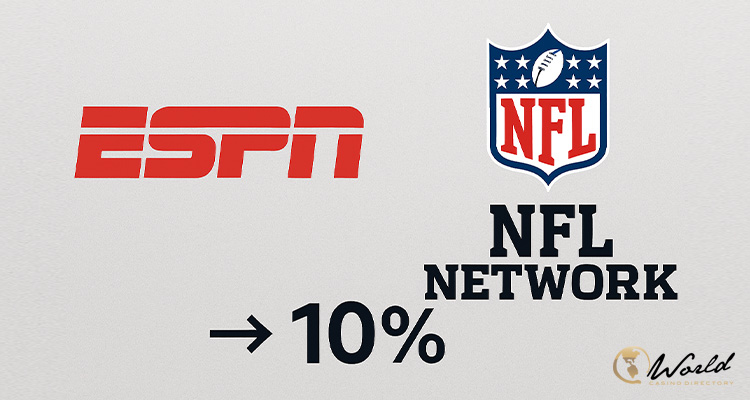In a groundbreaking development set to transform how football fans consume the game, ESPN and the National Football League (NFL) have reached a transformative agreement that will see ESPN acquire NFL Network and other major NFL media properties. In exchange, the NFL will receive a 10% ownership stake in ESPN, which is currently 80% owned by Disney and 20% by Hearst. Once finalized, ESPN’s equity will be divided 72% Disney, 18% Hearst, and 10% NFL.
The historic transaction, announced via a non-binding agreement, includes the NFL’s linear RedZone Channel, NFL Fantasy, and a range of digital rights. The move marks a strategic realignment between the country’s most-watched sports league and the most recognized sports media brand, ahead of ESPN’s launch of its new direct-to-consumer (DTC) streaming platform later this month.
Robert A. Iger, CEO of The Walt Disney Company, praised the alignment of two powerful entertainment entities, stating, “Today’s announcement paves the way for the world’s leading sports media brand and America’s most popular sport to deliver an even more compelling experience for NFL fans, in a way that only ESPN and Disney can.”
Redefining Fan Engagement Across Platforms
The acquisition aims to revolutionize how professional football is distributed and experienced. ESPN’s expanded media rights portfolio will enable broader access to NFL programming across cable, satellite, and streaming services, including the upcoming ESPN DTC platform priced at $29.99 per month. Subscribers to traditional providers will receive access to this content at no additional cost.
Under the terms of the agreement, ESPN will operate NFL Network—reaching nearly 50 million subscribers—and integrate it into its direct-to-consumer offering. The company will also take over linear distribution of the RedZone Channel to cable and satellite providers, though the NFL will retain digital rights and continue producing the channel.
Hans Schroeder, the NFL’s executive vice president of media distribution, acknowledged the significance of the transition: “This is new as far as a partner now operating a business that we built, ran and grew… We’ll continue to balance that in a really arm’s length way.”
Additionally, ESPN will now manage the merged NFL Fantasy and ESPN Fantasy platforms, forming the official fantasy game of the NFL. This integration promises an enhanced digital experience tailored to a growing global audience of fantasy football players.
Expansion of NFL Programming and Streaming Reach
As part of the arrangement, ESPN’s platforms will now license three extra NFL games per season to air on NFL Network. Meanwhile, four ESPN matchups—some scheduled in overlapping Monday night slots—will shift to NFL Network, which will continue to broadcast seven games annually.
The NFL will continue to oversee its core media holdings, including NFL Films, NFL+, NFL.com, the NFL FAST Channel, the NFL Podcast Network, and the official websites of all 32 teams. Despite relinquishing operational control of NFL Network, the league maintains authority over other major digital and production assets.
Jimmy Pitaro, ESPN Chairman, emphasized the collaboration’s long-term impact: “By combining these NFL media assets with ESPN’s reach and innovation, we’re creating a premier destination for football fans… This deal helps fuel ESPN’s digital future.”
The agreement also builds on ESPN’s longstanding relationship with the NFL Draft, which it has broadcast since 1980. Under a newly extended licensing deal, ESPN will maintain comprehensive rights to the event, with coverage extending to Disney+ and Hulu starting with the 2026 NFL Draft. ABC, ESPN, and ESPN Deportes will continue to air Rounds 1-3, with ESPN carrying Rounds 4-7. A new daily NFL Draft-focused show is also set to premiere on ESPN2 the day after the Super Bowl, running through the Draft.
Strategic Implications and What Comes Next
The NFL’s 10% equity in ESPN, valued at approximately $2.2 to $2.5 billion, is part of the league’s broader revenue growth strategy, with a longstanding target of reaching $25 billion annually by 2027. Industry analysts see the deal as a savvy move by ESPN to solidify its market position with exclusive, high-demand content in an increasingly fragmented media landscape.
For the NFL Network, the transition offers a potential revival. The channel has recently faced programming cuts, including the cancellation of its flagship show, Total Access and the relocation of Good Morning Football. Now based near SoFi Stadium in Inglewood, California, the network is poised for revitalization under ESPN’s stewardship.
NFL Commissioner Roger Goodell reflected on the move, saying, “The Network’s sale to ESPN will build on this remarkable legacy, providing more NFL football for more fans in new and innovative ways.”
The finalization of the agreement is still pending and must pass regulatory reviews and receive approval from NFL team owners. Once approved, it is expected to take effect in 2026, in time to support ESPN’s broader digital expansion and NFL’s push into new frontiers of fan engagement.


